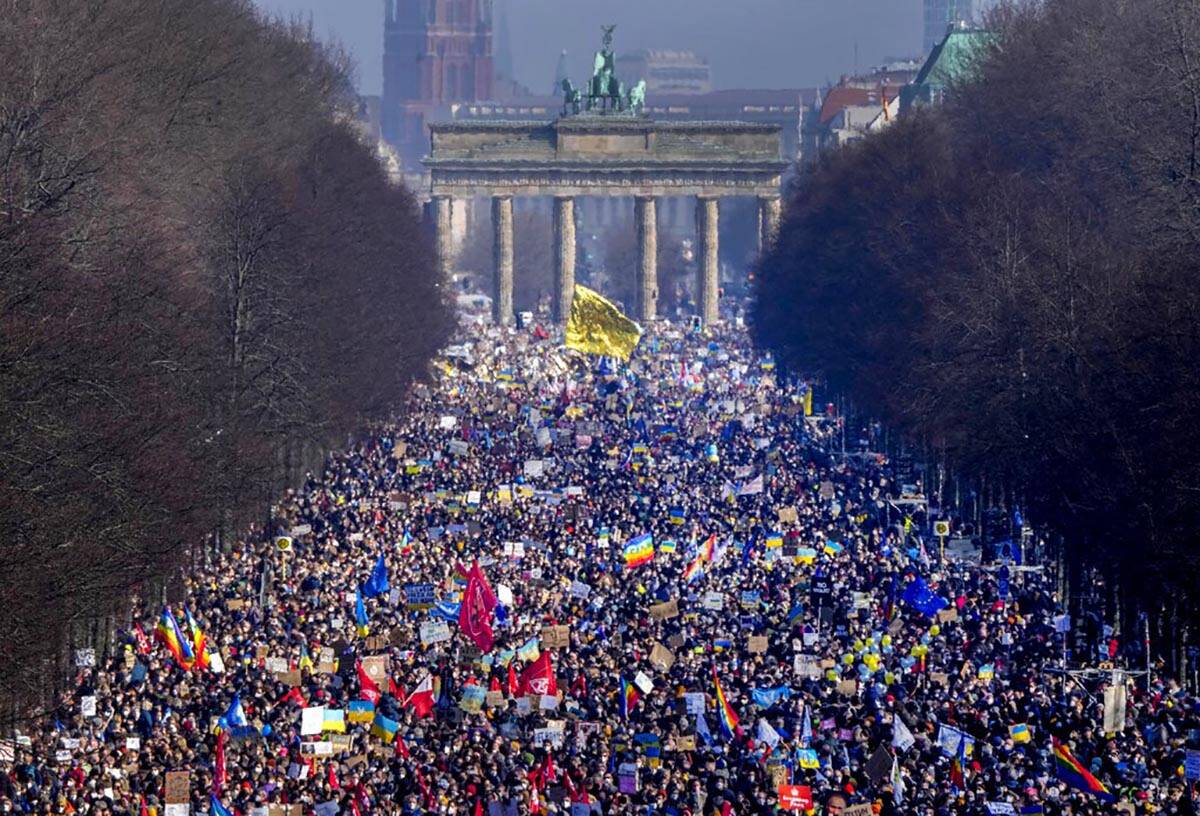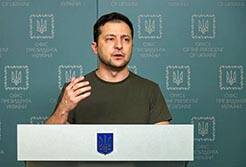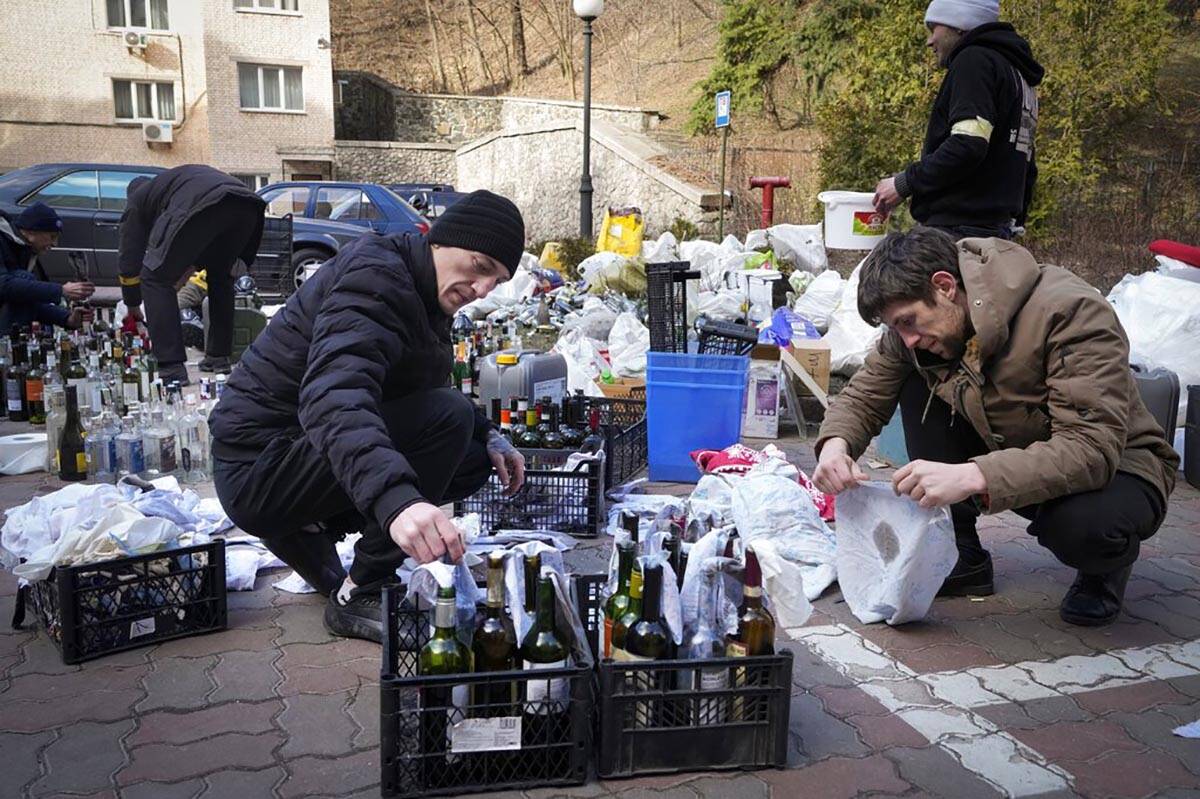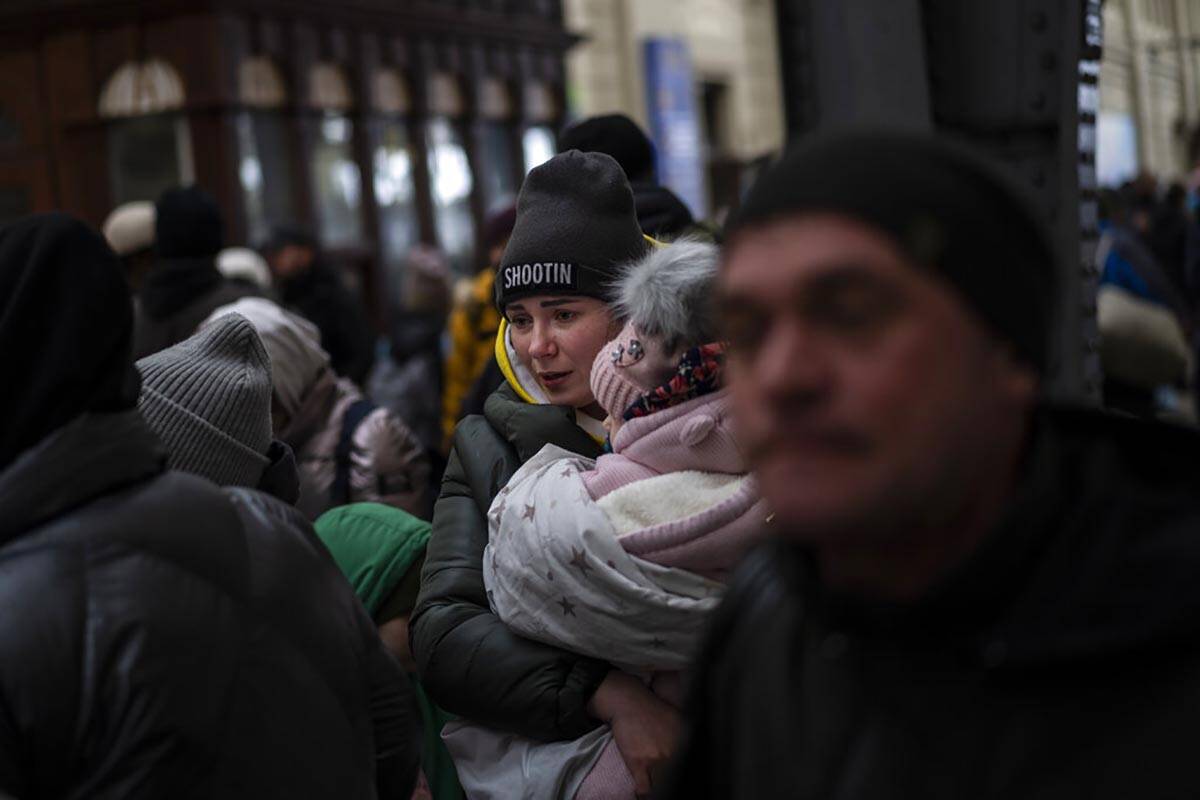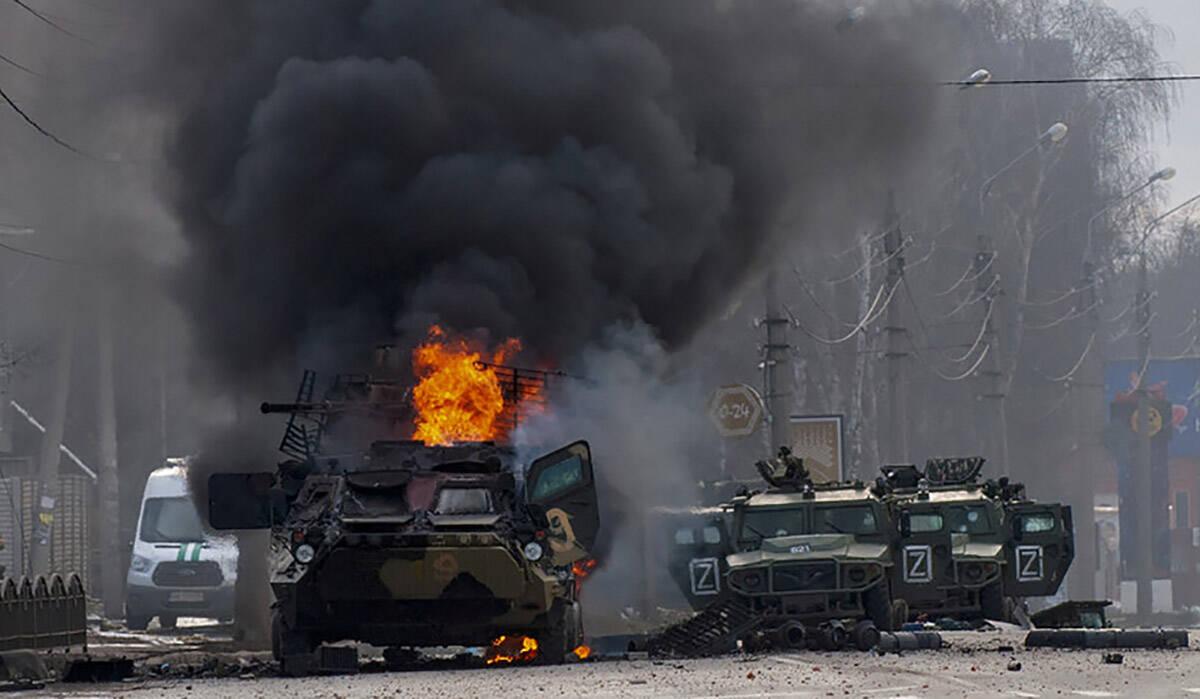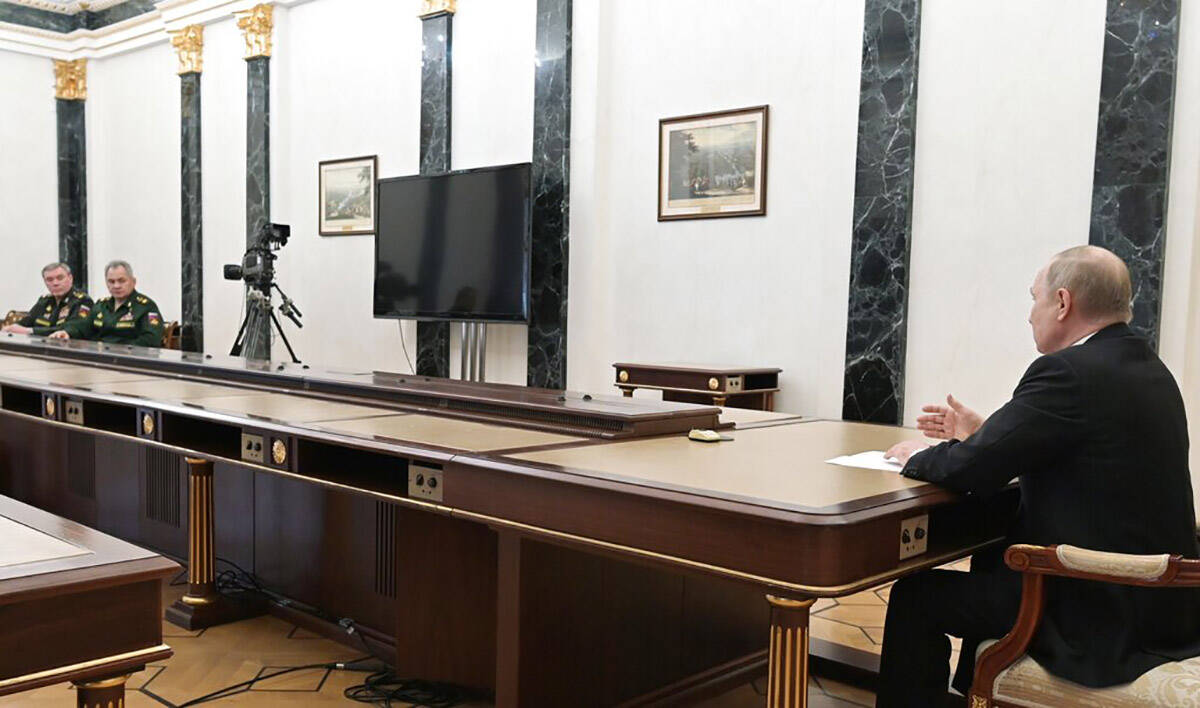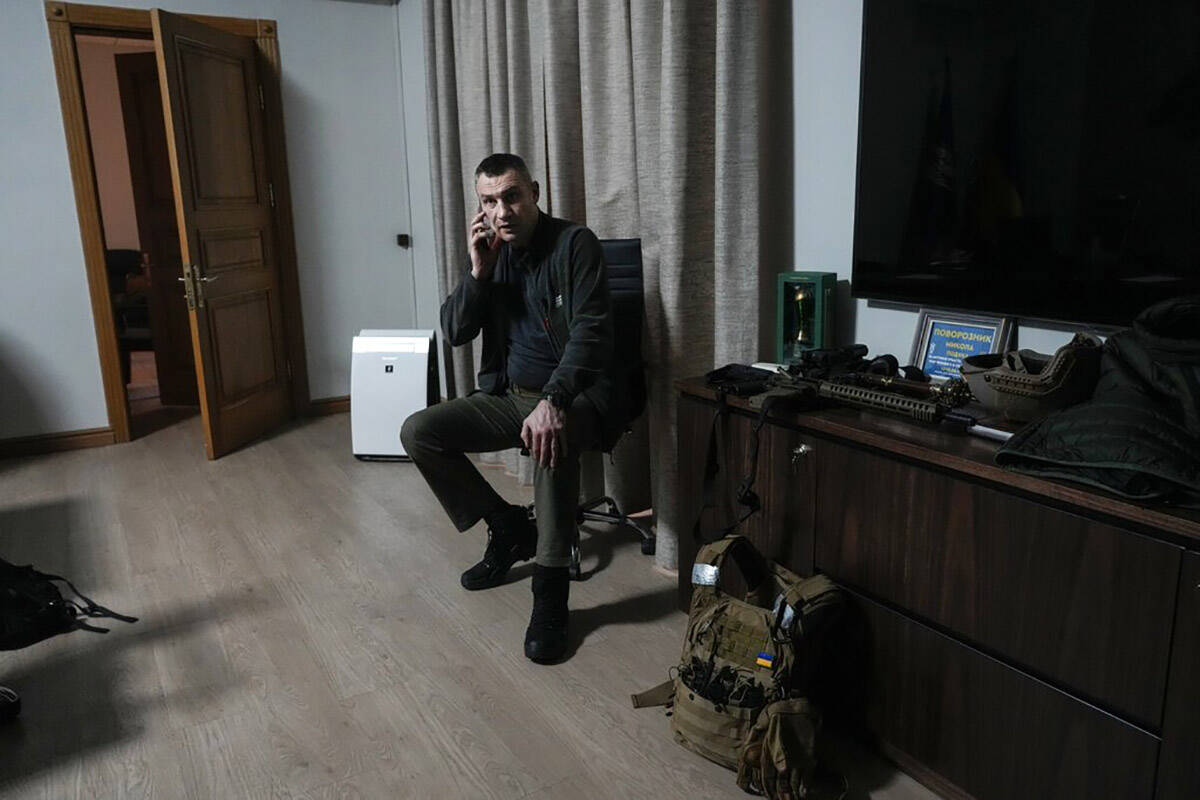Russia expected to get help from Belarus on Monday, US says
WASHINGTON — A senior U.S. intelligence official says Belarus is expected to send troops into Ukraine as soon as Monday to fight alongside Russian forces that invaded Ukraine last week.
Belarus has been providing support for Russia’s war effort, but so far has not taken a direct part in the conflict.
The American official has direct knowledge of current U.S. intelligence assessments and says the decision by Belarus’ leader on whether to bring Belarus further into the war depends on talks between Russia and Ukraine happening in the coming days. The official spoke anonymously to discuss the sensitive information.
Russian forces have encountered strong resistance from Ukraine defenders, and U.S. officials say they believe the invasion has been more difficult, and slower, than the Kremlin envisioned, though that could change as Moscow adapts.
Two U.N. meetings Monday
the 193-nation General Assembly and the more powerful 15-member Security Council — are holding separate meetings Monday on Russia’s invasion of Ukraine, reflecting widespread demands for a cease-fire and escalating concern for the millions of Ukrainians caught up in the war.
The Security Council gave a green light Sunday for the first emergency session of the General Assembly in decades. It will give all U.N. members an opportunity to speak about the war Monday and vote on a resolution later in the week that U.S. Ambassador Linda Thomas-Greenfield said would “hold Russia to account for its indefensible actions and for its violations of the U.N. Charter.”
French Ambassador Nicolas De Riviere announced that the Security Council will hold a meeting Monday afternoon on the humanitarian impact of Russia’s invasion, a session sought by French President Emmanuel Macron to ensure the delivery of aid to growing numbers of those in need in Ukraine.
Both meetings follow Russia’s veto Friday of a Security Council resolution demanding that Moscow immediately stop its attack on Ukraine and withdraw all troops. The vote was 11-1, with China, India and the United Arab Emirates abstaining.
De Riviere said France and Mexico will propose a draft resolution “to demand the end of hostilities, protection of civilians, and safe and unhindered humanitarian access to meet the urgent needs of the population.” It said it will probably be put to a vote Tuesday.
Sunday’s vote in the Security Council on a resolution co-sponsored by the United States and Albania to authorize the General Assembly session was exactly the same as on Friday — 11-1 and three abstentions. But because council approval for such a session is considered a procedural vote there are no vetoes and the resolution got more than the minimum nine “yes” votes needed for approval.
Last week, Ukraine asked for a special session of the General Assembly to be held under the so-called “Uniting for Peace” resolution, initiated by the United States and adopted in November 1950 to circumvent vetoes by the Soviet Union during the 1950-53 Korean War. That resolution gives the General Assembly the power to call an emergency session to consider matters of international peace and security when the Security Council is unable to act because of the lack of unanimity among its five veto-wielding permanent members — the United States, Russia, China, Britain and France.
The U.S. ambassador told the council after Sunday’s vote that members had taken an important step forward in holding Russia accountable for its “unjustifiable assault, fabricated out of lies and the rewriting of history,” and now all nations can be heard in the General Assembly.
Ruble plummets 26%
The ruble sank nearly 26% against the U.S. dollar early Monday after Western nations moved to block Russian banks from the SWIFT global payment system.
The ruble was trading at a record low 105.27 per dollar, down from about $84 per dollar late Friday.
Over the weekend, Japan joined the moves by the U.S. and other western nations to impose more sanctions against Russia.
Restrictions on the Russian central bank target its access to more than $600 billion in reserves the Kremlin has at its disposal. They hinder Russia’s ability to support the ruble as it plunges in value.
Sanctions announced earlier had taken the Russian currency to its lowest level against the dollar in history.
Putin orders high alert for nuclear forces
President Vladimir Putin dramatically escalated East-West tensions by ordering Russian nuclear forces put on high alert Sunday, while Ukraine’s embattled leader agreed to talks with Moscow as Putin’s troops and tanks drove deeper into the country, closing in around the capital.
Citing “aggressive statements” by NATO and tough financial sanctions, Putin issued a directive to increase the readiness of Russia’s nuclear weapons, raising fears that the invasion of Ukraine could boil over into nuclear war, whether by design or mistake.
The Russian leader is “potentially putting in play forces that, if there’s a miscalculation, could make things much, much more dangerous,” said a senior U.S. defense official, speaking on condition of anonymity.
Amid the mounting tensions, Western nations said they would buy and deliver weapons for Ukraine, including Stinger missiles for shooting down helicopters and other aircraft, and Ukrainian President Volodymyr Zelenskyy’s office announced plans for a meeting with a Russian delegation at an unspecified location on the Belarusian border.
It wasn’t immediately clear when the meeting would take place, nor what the Kremlin was ultimately seeking, either in those potential talks on the border or, more broadly, in its war in Ukraine.
The fast-moving developments came as scattered fighting was reported in Kyiv. Battles also broke out in Ukraine’s second-largest city, Kharkiv, and strategic ports in the country’s south came under assault from Russian forces. By late Sunday, Russian forces had taken Berdyansk, a Ukrainian city of 100,000 on the Azov Sea coast, according to Oleksiy Arestovich, an adviser to Zelenskyy’s office.
Russians close in on Kyiv
With Russian troops closing in around Kyiv, a city of almost 3 million, the mayor of the capital expressed doubt that civilians could be evacuated.
Across the country, Ukrainian defenders were putting up stiff resistance that appeared to slow Russia’s advance.
In the southern port city of Mariupol, where Ukrainians were trying to fend off attack, a medical team at a city hospital desperately tried to revive a 6-year-old girl in unicorn pajamas who was mortally wounded in Russian shelling.
During the rescue attempt, a doctor in blue medical scrubs, pumping oxygen into the girl, looked directly into the Associated Press video camera capturing the scene.
“Show this to Putin,” he said angrily. “The eyes of this child, and crying doctors.”
Their resuscitation efforts failed, and the girl lay dead on a gurney, her jacket spattered with blood.
Nearly 900 kilometers (560 miles) away, Faina Bystritska was under threat in the city of Chernihiv.
“I wish I had never lived to see this,” said Bystritska, an 87-year-old Jewish survivor of World War II. She said sirens blare almost constantly in the city, about 150 kilometers (90 miles) from Kyiv.
Chernihiv residents have been told not to switch on any lights “so we don’t draw their attention,” said Bystritska, who has been living in a hallway, away from any windows, so she could better protect herself.
“The window glass constantly shakes, and there is this constant thundering noise,” she said.
More sanctions detailed
Meanwhile, the top official in the European Union outlined plans by the 27-nation bloc to close its airspace to Russian airlines and buy weapons for Ukraine.
“For the first time ever, the European Union will finance the purchase and delivery of weapons and other equipment to a country that is under attack,” said European Commission President Ursula von der Leyen. The EU will also ban some pro-Kremlin media outlets, she said.
The U.S. also stepped up the flow of weapons to Ukraine, announcing it will send Stinger missiles, as part of a package approved by the White House on Friday. Germany likewise plans to send 500 Stingers and other military supplies.
Also, the 193-member U.N. General Assembly scheduled an emergency session Monday on Russia’s invasion.
Putin, in ordering the nuclear alert, cited not only statements by NATO members but the hard-hitting financial sanctions imposed by the West against Russia, including Putin himself.
“Western countries aren’t only taking unfriendly actions against our country in the economic sphere, but top officials from leading NATO members made aggressive statements regarding our country,” Putin said in televised comments.
U.S. defense officials would not disclose their current nuclear alert level except to say that the military is prepared all times to defend its homeland and allies.
White House: Putin manufactures threats
White House press secretary Jen Psaki told ABC that Putin is resorting to the pattern he used in the weeks before the invasion, “which is to manufacture threats that don’t exist in order to justify further aggression.”
The practical meaning of Putin’s order was not immediately clear. Russia and the United States typically have land- and submarine-based nuclear forces that are on alert and prepared for combat at all times, but nuclear-capable bombers and other aircraft are not.
If Putin is arming or otherwise raising the nuclear combat readiness of his bombers, or if he is ordering more ballistic missile submarines to sea, then the U.S. might feel compelled to respond in kind, said Hans Kristensen, a nuclear analyst at the Federation of American Scientists.
Earlier Sunday, Kyiv was eerily quiet after explosions lit up the morning sky and authorities reported blasts at one airport. A main boulevard was practically deserted as a strict curfew kept people off the streets. Authorities warned that anyone venturing out without a pass would be considered a Russian saboteur.
Hunkered down
Terrified residents hunkered down in homes, underground garages and subway stations in anticipation of a full-scale Russian assault. Food and medicine were running low, Kyiv Mayor Vitali Klitschko said.
Authorities have been handing out weapons to anyone willing to defend the city. Ukraine is also releasing prisoners with military experience who want to fight, and training people to make firebombs.
“Right now, the most important question is to defend our country,” Klitschko said.
In downtown Kharkiv, 86-year-old Olena Dudnik said she and her husband were nearly thrown from their bed by the pressure blast of a nearby explosion.
“Every day there are street fights, even downtown,” with Ukrainian fighters trying to stop Russian tanks, armored vehicles and missile launchers, Dudnik said by phone. She said the lines at drugstores were hours long.
“We are suffering immensely,” she said. “We don’t have much food in the pantry, and I worry the stores aren’t going to have anything either, if they reopen.” She added: “I just want the shooting to stop, people to stop being killed.”
U.S. says Russians will adapt
Pentagon officials said that Russian troops are being slowed by Ukrainian resistance, fuel shortages and other logistical problems, and that Ukraine’s air defense systems, while weakened, are still operating.
But a senior U.S. defense official said that will probably change: “We are in day four. The Russians will learn and adapt.”
Putin hasn’t disclosed his ultimate plans, but Western officials believe he is determined to overthrow Ukraine’s government and replace it with a regime of his own, reviving Moscow’s Cold War-era influence.
The number of casualties from Europe’s largest land conflict since World War II remained unclear amid the fog of war.
Ukraine’s health minister reported Saturday that 198 people, including three children, had been killed and more than 1,000 others wounded. It was not clear whether those figures encompassed both military and civilian casualties.
Russian Defense Ministry spokesman Maj. Gen. Igor Konashenkov gave no figures on Russia’s dead and wounded but said Sunday his country’s losses were “many times” lower than Ukraine’s.
368K refugees
About 368,000 Ukrainians have arrived in neighboring countries since the invasion started Thursday, according to the U.N. refugee agency.
Along with military assistance, the U.S., European Union and Britain also agreed to block selected Russian banks from the SWIFT system, which moves money around thousands of banks and other financial institutions worldwide. They also moved to slap restrictions on Russia’s central bank.
Russia’s economy has taken a pounding since the invasion, with the ruble plunging and the central bank calling for calm to avoid bank runs.
Russia, which massed almost 200,000 troops along Ukraine’s borders, claims its assault is aimed only at military targets, but bridges, schools and residential neighborhoods have also been hit.
___
Isachenkov reported from Moscow. Ellen Knickmeyer, Eric Tucker, Robert Burns and Hope Yen in Washington; Francesca Ebel, Josef Federman and Andrew Drake in Kyiv; Mstyslav Chernov and Nic Dumitrache in Mariupol, Ukraine; and other AP journalists from around the world contributed to this report.




